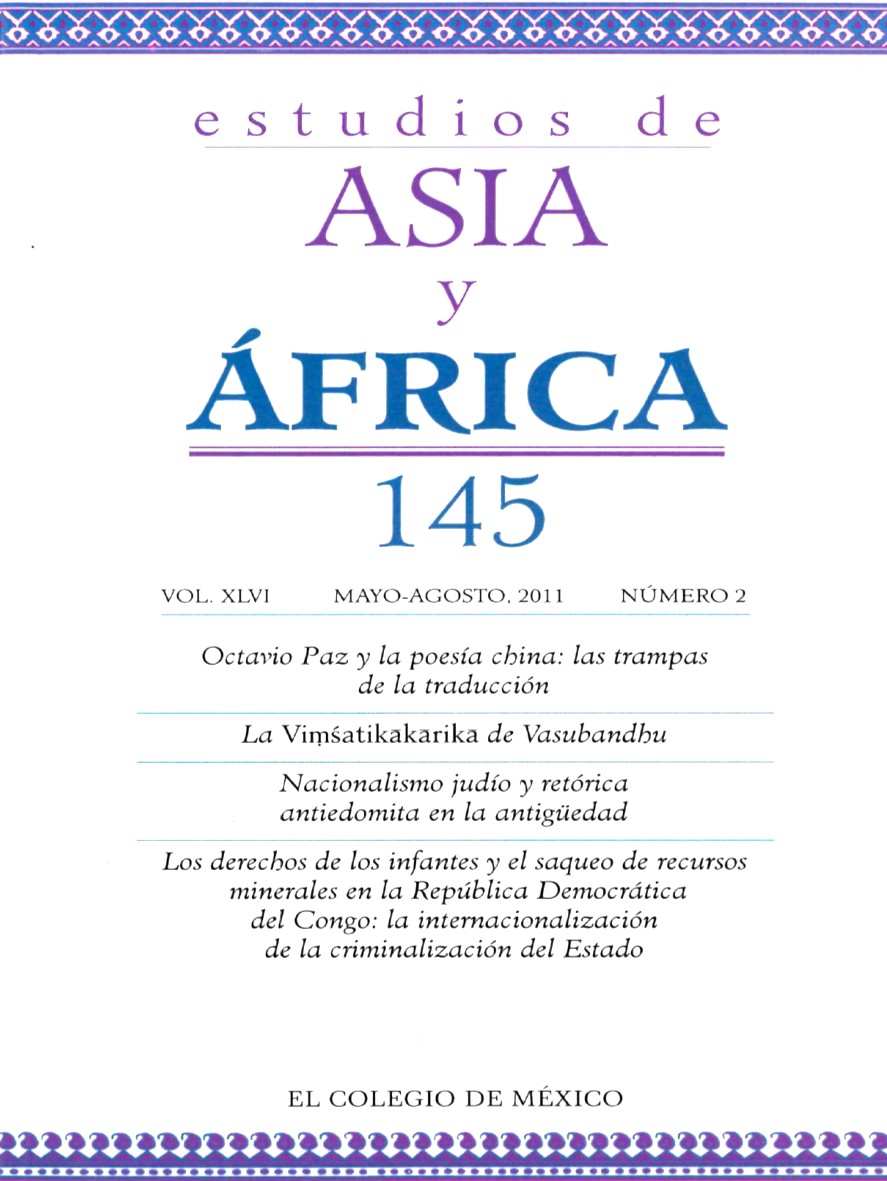Abstract
In his writings, Octavio Paz always showed an interest in the “Far East”, and he translated several texts from India, China and Japan. He was first attracted to Chinese poetry by Ezra Pound’s translations, which in turn were inspired by his reading of Ernest Fenollosa’s theory on Chinese ideography. Paz broadened his knowledge of Chinese poetry by reading Wai-lim Yip, James Liu and Arthur Waley, and he found his own way in translating Chinese poems. The result is best illustrated in his treatment of the poem Deer Park, by Tang dynasty poet Wang Wei (701-762), which he translated several times. These translations constitute a sample of Paz’s ability to awaken our interest in Chinese poetry and at the same time allow us to admire his talent.
References
Fenollosa, Ernest y Ezra Pound, Los caracteres de la escritura china como medio poético, trad. de Salvador Elizondo, México, Universidad Autónoma Metropolitana, 1980.
Kern, Robert, Orientalism, Modernism, and the American Poem, Nueva York, Cambridge University, 1996.
Kim, Kwon Tae Jung, El elemento oriental en la obra de Octavio Paz, México, Universidad de Guadalajara, 1989.
Liu Jo-yü, James, The Art of Chinese Poetry, Londres, Routledge & Paul, 1962.
Miranda, Roberto Santiago, El pensamiento oriental en la obra de Octavio Paz, Cambridge, Mass., Harvard University, 1989.
Paz, Octavio, Conjunciones y disyunciones, México, Joaquín Mortiz, 1991.
____________, Cuadrivio, México, Joaquín Mortiz, 1991.
____________, “Juego”, Poesía en movimiento, México, Siglo XXI, 1996.
____________, “Los hijos del limo”, en Obras completas, t. 1, México, Fondo de Cultura Económica, 1994.
____________, Traducción: literatura y literalidad, Barcelona, Tusquets, 1990.
____________, “Trazos” (“Versiones y diversiones”), en Obras completas, t. 12, Obra poética II, México, Fondo de Cultura Económica, 1994.
____________, “Variaciones chinas”, Corriente alterna, en Obras completas, t. 2, Excusiones e incursiones, México, Fondo de Cultura Económica, 1994.
____________, 1914-1998, Versiones y diversiones, Barcelona, Galaxia Gutenberg, 2001.
Pound, Ezra, Personae/Ezra Pound, México, Domés, 1981, 357 p.
____________, Selected Poems, T. S. Eliot (ed.), Londres, Faber and Faber, 1928.
____________, The Cantos of Ezra Pound, Nueva York, New Directions, 1995.
Qian Zhaoming, Ezra Pound & China, Michigan, University of Michigan Press, 2006, 297 p.
Said, Edward, Orientalism, Nueva York, Vintage Books, 1979.
Shih Ching, The Classic Anthology Defined by Confucius, Ezra Pound (trad.), Cambridge, Mass., Harvard University, 1954.
Snyder, Gary, 1930-No Nature: New and Selected Poems, Nueva York, Pantheon, 1992.
Sosa, Víctor, El Oriente en la poética de Octavio Paz, México, Secretaría de Cultura, Gobierno del Estado de Puebla, 2000.
Valencia, Guillermo, Catay, poemas orientales, Bogotá, Cromos, 1929.
Waley, Arthur, Chinese Poems, selected from 170 Chinese poems, more translation from the Chinese, the temple and the book of songs, Londres, George Allen and Unwin, 1962.
Wang Wei, 699-759, 99 cuartetos de Wang Wei y su círculo, Anne-Hélene Suárez Girard (ed. y trad.), Madrid, Pre-Textos, 2000.
Watson, Burton, Chinese Lyricism: Shih Poetry from the Second to the Twelfth Century, Nueva York, Columbia University Press, 1971.
Yip Wai-Lim, Chinese Poetry: Major Modes and Genres/Calligraphy by Kuo-hsiung Chen, Los Ángeles, University of California, 1976.
Revistas
Weinberger, Eliot, “Diecinueve maneras de ver a Wang Wei. Cómo se traduce un poema chino”, Ulalume González de León (trad.), Vuelta, núm. 91, vol. 8, junio de 1984, México, pp. 18-25.
Bradu, Fabienne, “Octavio Paz traductor”, Vuelta, núm. 259, junio de 1998, pp. 30-37.
Maeth Ch., Russell, “Para leer Nineteen Ways of Looking at Wang Wei”, Estudios de Asia y África, núm. 86, vol. XXVI, septiembre-diciembre, 1991, México, El Colegio de México, pp. 591-612.
Sitios en internet
Álvarez, José Ramón, “Tres poetas latinoamericanos traductores de poesía china” [consultado el 20 de agosto de 2007 en http://www.gio.gov.tw/info/nation/sp/fcr/1998/78/p40.htm].
Kennedy, George, “Fenollosa, Pound and the Chinese Character”, en Selected Works, Yale Literary Magazine, vol. 126, núm. 5, diciembre de 1958, pp. 24-36 [consultado el 21 de agosto de 2007 en http://www.pinyin.info/readings/texts/ezra_pound_chinese.html].
This work is licensed under a Creative Commons Attribution-NonCommercial-NoDerivatives 4.0 International License
Copyright 2022 Estudios de Asia y África


